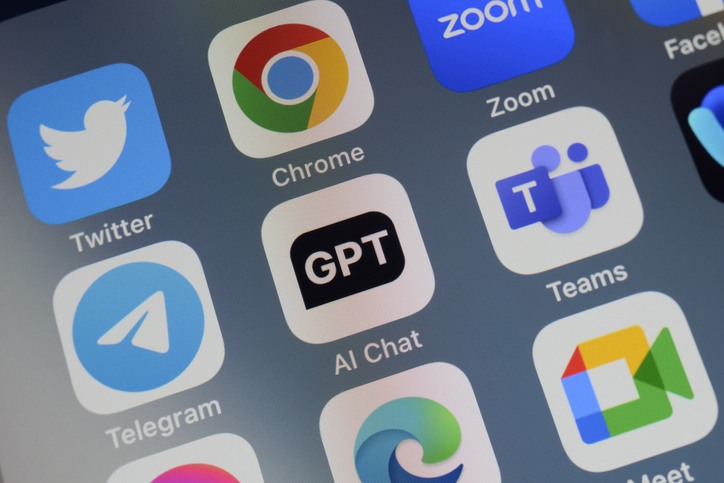Should you be using ChatGPT for your business and how should you be using it?
Should you be using ChatGPT for your business and how should you be using it?

Whether you like it or not, 2023 has been a year dominated by ChatGPT. It’s certainly been at the forefront of conversations not only among marketers, content creators and others in our industry, but also with our clients. There’s a robot-induced buzz… Could it save you time? Could it make you rank higher on Google? Might it bring more enquiries to your front door than you’d even know what to do with? Let’s take a look….
What actually is ChatGPT?
Launched in November 2022 by OpenAI, ChatGPT stands for Chat Generative Pre-trained Transformer. To you and me, this basically means it’s a bot that has been fed mountains and mountains of data. It then uses this data to provide answers to… well, pretty much anything. It can answer questions, summarise information, generate copy, write code, and so much more – and will attempt to do as authentically as possible, mimicking a human conversation.
ChatGPT can be a lot of fun. But while asking it to cook up nursery rhymes about WWE fighters might be an amusing way to pass the time (probably for a minority that one!), is ChatGPT equally worth using to create highly effective, targeted content for your business? Let’s discuss.
What are the key benefits of using ChatGPT?
- It’s quick and easy to use – this can make your work much more efficient. For instance, rather than spending hours putting together a blog, ChatGPT will create you one in seconds (we did write this one though!).
- If you have an internet connection, ChatGPT is accessible to all.
- It can help with idea generation when you’re battling creator’s block.
Sounds incredible, right? Not so fast…
The danger of cutting corners
The thing is, just because you can use something, doesn’t always mean you should, or at least not all the time. Sure, you can use ChatGPT to write your new landing page copy, or to quickly whip up an email you need to send out within the next 10 minutes, but what’s the cost? Quality: that’s the cost. And if the quality drops? So could your traffic, sales, revenue, reputation… and so on…
That might sound terribly pessimistic, but let’s dig deeper into this.
You’re one the greatest assets your business has (if not the greatest asset). You understand your brand, its values, and its mission better than any bot ever could. And by getting ChatGPT to create your content, you are at risk of losing the very things that make your brand stand out. You may well start to sound just a bit more like everyone else does.
Let’s say you’re a holiday cottage based in the South West and you want to write a social media post about the best nearby beaches. ChatGPT will sort that out for you. But it will sort it out for anyone else too. And so, if we’re all using the same bot to cook up the same fun, snappy content, you’re going to lose your brand’s tone of voice.
While you can train ChatGPT to learn more and more about your brand and the writing style you’re after, this does take time and a lot of steering. And let’s be honest, regardless of the tone of voice you’re after, ChatGPT always leans towards relatively cheesy, sales-heavy copy. That might not be what you’re after.
No original content
Let’s reflect again on how ChatGPT works. In simple terms, it’s fed masses and masses of information and learns how to imitate this information as best as possible. In other words, it’s regurgitating existing content. No new ideas. No fresh opinions. Just copy and paste in a thousand different ways. So, if you’re looking to create original content with original ideas, you can’t leave it all to ChatGPT.
Will Google penalise content created by ChatGPT?
Google hasn’t stated that it’s outright against ChatGPT. In fact, their opinions concerning AI have been fairly inconsistent over the past years. On the one hand, Google’s Managing Director Sundar Pichai has described AI as the key ingredient to making people “more productive than we have ever imagined.” Google even has its own rival to ChatGPT called Bard. On the other hand, Google claims it will penalise content generated by AI.
While there are certainly ways that Google can detect whether content has been AI-generated, they haven’t officially confirmed whether they are actively tracking this.
But one thing we do know is that Google is against content that doesn’t make sense or add value. Any content that Google considers spammy will certainly be ranked lower.
In Google’s guidelines, they talk about “Spammy automatically-generated content” which they define as: “content that’s been generated programmatically without producing anything original or adding sufficient value; instead, it’s been generated for the primary purpose of manipulating search rankings and not helping users.” They give examples such as text translated by an automated tool without human review, or text generated through automated processes without regard for quality or user experience.
The thing is that ChatGPT is notorious for producing this type of content – blogs stuffed with keywords but that don’t actually provide any substance. And so, you cannot rely solely on ChatGPT to help you climb the ranks of Google. Instead, you should be focussing on creating valuable content that your target audience will genuinely engage with.
Thinking practically
ChatGPT is good, but it’s not perfect. Sometimes it slips up and creates copy that simply doesn’t make sense, or is full of false information, or is just repeating the same sentences again and again. That means you have to go through your work with a fine-tooth comb and edit it. And that’s fine – to an extent. If you’re spending too much time cutting and snipping away at your ChatGPT-generated content, all it’s doing is giving you a false sense of efficiency.
So, is ChatGPT not worth it?
Is this to say that ChatGPT is worth ignoring? Not necessarily. Firstly, ChatGPT isn’t going to be the end of AI – not even close. And as systems evolve, they are going to offer a lot more potential. So, knowing what’s out there will only help you and your business to remain agile.
And yes, we know we said ChatGPT isn’t the best place for creating original content, but nevertheless, it’s still a useful tool for idea generation. If you can’t think of any new blog ideas, for instance, ChatGPT will happily give you some inspiration. By all means take it, but be prepared to bring your own ideas to the table too.
The key with ChatGPT is that the more specific you can be, the better. If you ask it to create an entire marketing strategy for you, it’ll be generic and relatively useless. If you ask if to recommend 5 free tools for social media content creation, however, you’ll get a much more defined answer.
The more you use ChatGPT, the more you’ll understand its strengths and weaknesses. And the better you’ll become at delegating tasks to it.
If you would like more digital marketing advice, get in touch with the MiHi team on 01566 232323 or email us at hello@mihidigital.co.uk.


